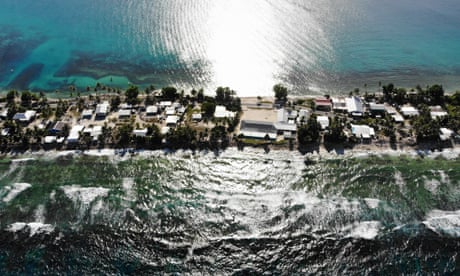
He won’t.
The global warming catastrophe manifestly demands changes to the human relationship with nature. It forces a rethink of how we work, how we live, how we travel and much else besides.
These issues are the quintessence of politics. They demand more, not less, debate – and imagining that a “peace” could or should be brokered in respect of them is akin to urging candidates to forego “election wars” when they run for office.
The yearning for an apolitical response to an intensely political crisis can be traced to a different historical period.
As I’ve noted before, warnings about climate change first emerged in the late 1980s, the zenith of neoliberalism.
When James Hansen from Nasa’s Goddard Institute for Space Studies told the US Senate about his confidence in a global warming trend, free market ideas once associated with far-right cranks had already cohered into an unchallenged orthodoxy. The Thatcherite slogan “There is No Alternative” (to the market) exemplified the depoliticisation of neoliberalism, with the privatisations, deregulations, cuts and other signature policies of the era understood not as decisions but as externally imposed necessities.
Accordingly, from the Kyoto protocol onwards, the mainstream response to global warming centred on the commodification of the atmosphere: from cap-and-trade schemas in which companies bought and sold rights to pollute, to offset systems in which promises not to emit were traded.
These were bad choices. They were wrong choices. But, crucially, they weren’t presented as choices at all, with even many environmentalists accepting byzantine systems of financialisation as the only available option.
The global financial crisis shattered illusions in the omnipotence of the market. But if neoliberalism’s dead, its technocratic perspectives continue to shamble like zombies through the Australian public sphere.
Centrist commentators who came of age under the Hawke-Keating-Howard administrations still laud the free market reforms of that era as the acme of bold leadership and look upon the governments that followed as unfortunate aberrations.
With an Accord-admiring pragmatist like Albanese in power, they think that maybe, just maybe, the late unpleasantness about climate might give way to old-style consensus about market solutions, similar to that which prevailing at the 1992 Earth Summit when the Republican George HW Bush urged “concrete action to protect the planet”.
But that was a different time.
Precisely because neoliberal environmentalism proved a catastrophic failure (at least in terms of preventing carbon emissions – it worked quite well as a method of enriching corporations), global warming now manifests not as a future abstraction but as a horror show playing out in each day’s headlines.
The heatwave besetting Europe and northern Africa means that Portugal, Spain, France and Morocco currently face devastating fires (the headline in one Portuguese paper reads: “Panic and despair.”) Forecasters warn of unprecedented temperatures through swathes of the southern and western US; across China, some 900 million people will reportedly endure extreme conditions into August.
The emergency now impinges upon all the traditional cabinet portfolios.
You can’t discuss the economy without addressing Australia’s reliance on fossil fuels (which we export, don’t forget, at a rate exceeded only by Russia and Saudi Arabia). The World Bank warns of 200 million climate refugees by 2050: what does that mean for the old obsession with “stopping the boats”? Hospitals face new kinds of emergencies (with, for instance, British authorities expecting thousands to die in the current heat), schools grapple with preparing children for the grim future ahead, while Ukraine shows the complicated new relationship between defence and the energy transition.
Amid all of that, attempts to depoliticise the crisis will inevitably fail.
So why do they persist? Perhaps because, in the grim landscape of a dying planet, we’d like to believe that somewhere, somehow, an expert might save us.
Think of the common call to “listen to the scientists”.
Obviously, we should pay attention to researchers when they explain, say, the relationship between atmospheric carbon and India’s hottest March on record.
Yet there’s no “scientific” answer as to, say, who should bear the burden of transitioning away from fossil fuels.
At present, the disasters associated with a warming planet disproportionately harm the poor, even as the biggest 28 fossil fuel companies collectively raked in an eye-popping $100bn in profits during the first quarter of this year.
Whether we’re prepared to accept that depends on politics, not science.
For progressives, genuine climate action requires establishing the broadest possible constituency for change. But that’s not the same as a consensus and it doesn’t mean an end to conflict.
At present, 20 of the biggest fossil fuel corporations are projected to spend $932bn by 2030 opening new oil and gas fields – and $1.5tn by the end of 2040. They will lose vast sums if we decarbonise; they gain immensely if we don’t.
The companies provide an obvious method to assess any climate policy: we can judge its merits by how much or how little it makes them squeal.
In Australia, as elsewhere, the polluters wield immense power, both directly and through their paid apologists. When they feel threatened, they’ll fight back – hard.
But that’s the point. We don’t need to end the climate wars. We need to win them.
Jeff Sparrow is a Guardian Australia columnist

No comments:
Post a Comment